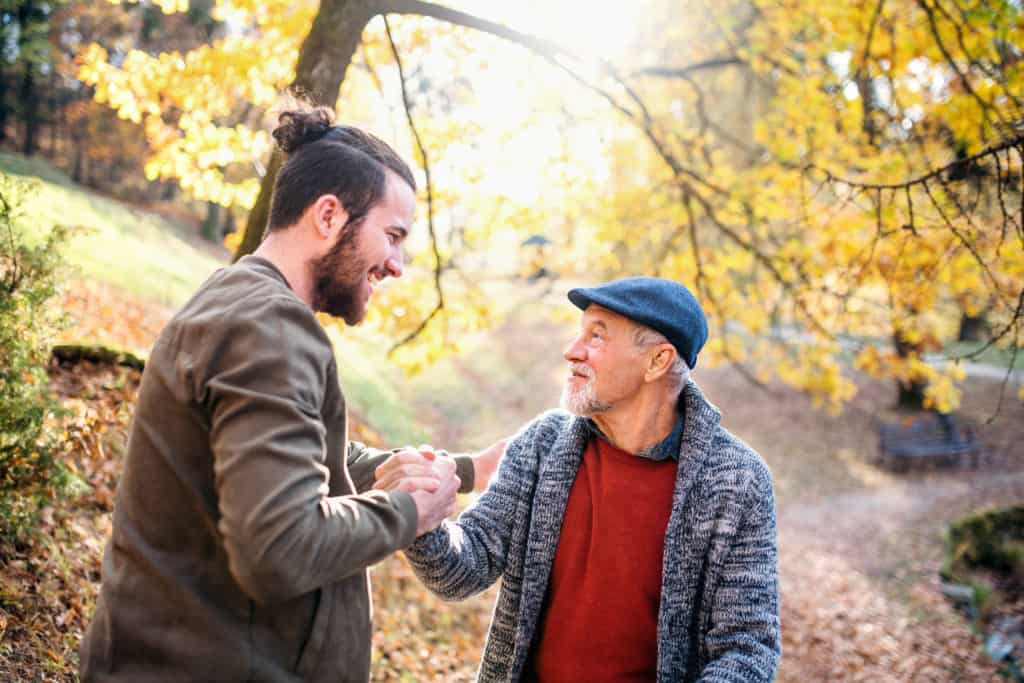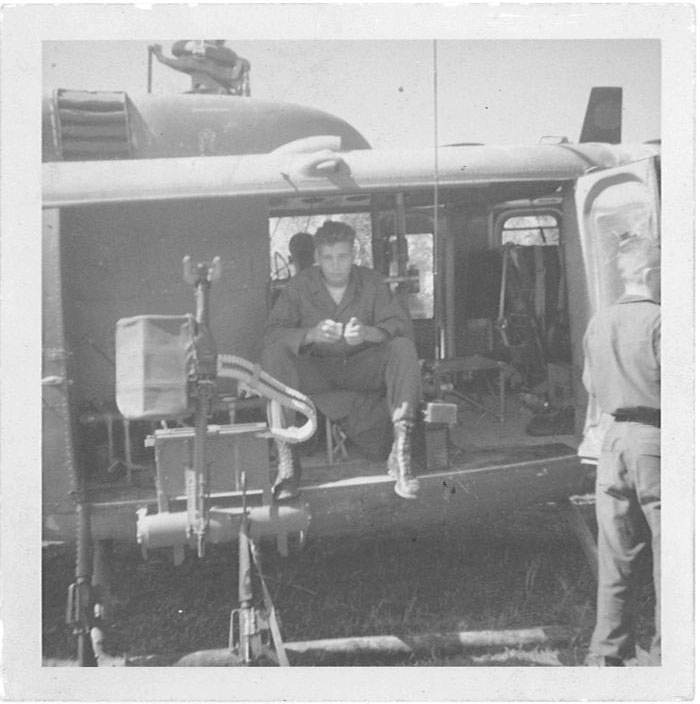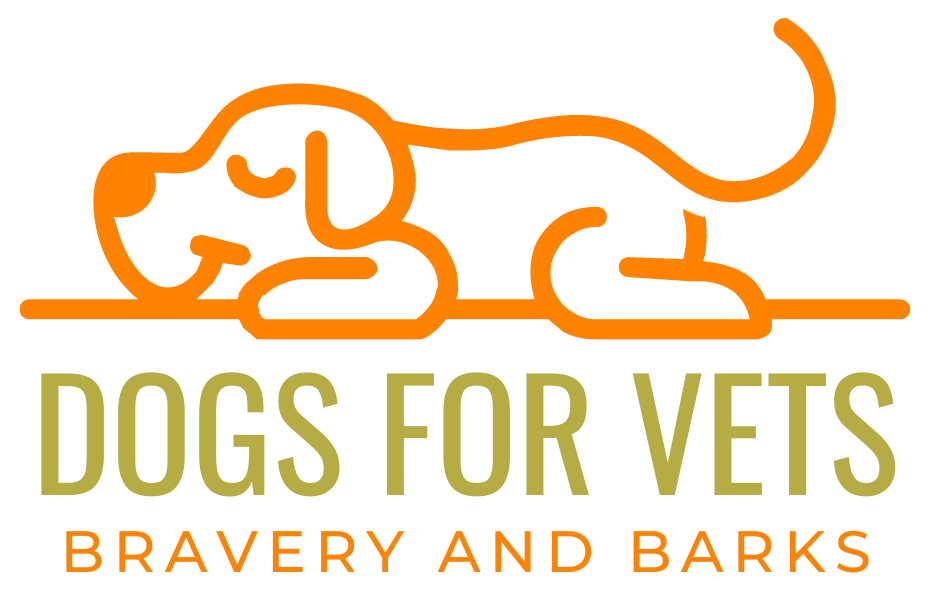This post may contain ads and affiliate links and we may earn a small commission when you click on the links at no additional cost to you. As an Amazon Affiliate, we earn from qualifying purchases. You can read our full disclaimer here.
Vietnam Veterans Helping Younger Veterans – the Important Role They Play

Vietnam Veterans can play a very important role in helping younger Veterans. They can share their stories about the war, talk to their spouses and children about dealing with a Veteran with PTSD, take them out to eat and get them out of their rut, and urge them to apply for benefits from the VA.
Younger Veterans need help adjusting to civilian life after serving our country, and Vietnam Veterans are in a unique position to provide that help.
Vietnam Veterans Helping Younger Veterans by Sharing Their Stories
The Vietnam War was a difficult and traumatic experience for those who served. Coming home from the war was often just as hard, if not harder. Many Veterans returned to a country that didn’t understand what they had been through and weren’t very welcoming.

As a result, many Vietnam Veterans kept their experiences to themselves, which only added to the difficulties they were already facing.
Now, decades later, Vietnam Veterans are in a position to help younger Veterans by sharing their stories. These stories can provide valuable insight and understanding for younger Veterans who are struggling to adjust to civilian life.
In addition, hearing these stories can help younger Veterans feel less alone and more connected to others who have experienced similar things.
If you are a Vietnam Veteran and you’re interested in sharing your story, there are a few ways to do so. You can contact your local Veterans Affairs office and ask about speaking to groups of Veterans or visit the National Museum of the United States Army to learn more and become better informed. Sharing your oral history can be a healing experience for both you and the younger Veterans who hear it.
Vietnam Veterans Helping other Veterans by Talking to Their Families about PTSD
Another way that Vietnam Veterans can help younger Veterans is by talking to their families about post-traumatic stress disorder (PTSD). Many Vietnam Veterans struggle with PTSD, and it can be difficult to talk about what they’re going through with their loved ones. However, this conversation is important.
Talking to your family about your PTSD can help them understand what you’re going through and how they can best support you. It can also be helpful for younger Veterans who may be dealing with similar issues. Seeing that someone else is successfully coping with PTSD can give them hope that they can do the same.
If you’re not sure how to start this conversation, the National Center for PTSD has a helpful guide that covers everything from how to explain PTSD to your loved ones to tips for managing holiday stress. Talking about your PTSD is an important step in getting the support you need and helping other Veterans who are struggling.
Vietnam Veterans can Help Younger Veterans by Getting Them Out of Their Rut
Many Vietnam Veterans had a hard time adjusting to civilian life after the war. As a result, they may have found themselves in a rut, struggling to find purpose and meaning in their lives. However, by reaching out to younger Veterans and helping them get out of their own ruts, Vietnam Veterans can make a real difference in their lives.
There are a number of ways to help a Veteran get out of a rut. You can take them out to lunch or coffee, go for a walk or hike together, or even just spend some time talking and getting to know each other. The important thing is that you provide some level of support and connection. letting them know that someone cares about them and is willing to help them through tough times.
Vietnam Veterans can Guide Younger Veterans in Getting Benefits from the VA
The Veterans Affairs (VA) provides a number of benefits and services to Veterans, but many Veterans don’t know about all the resources that are available to them. As a result, they may not be taking advantage of everything the VA has to offer.
Vietnam Veterans can help guide younger Veterans in getting the benefits and services they need from the VA. They can help them navigate the bureaucracy, connect them with resources, and provide moral support. This assistance can make a big difference in a Veteran’s life, helping them get the care and support they need to thrive.
If you’re interested in helping younger Veterans get the most out of their VA benefits, there are a few things you can do. You can start by visiting the VA website and familiarizing yourself with the benefits that are available.
You can also contact your local Veterans Affairs office and ask about volunteering opportunities. By taking the time to learn about the VA benefits system and how it works, you can be a valuable resource for younger Veterans.
Vietnam Veterans were not Welcomed Home Like Younger Veterans are Now
When Vietnam Veterans first came home from the war, they were not welcomed with open arms like younger Veterans are today. In fact, many Veterans felt isolated and alone, struggling to readjust to civilian life.
Thankfully, things have changed a lot since then. Today, there is much more support available for Veterans, and the public has a greater understanding of the challenges that Veterans face.
As a result, Vietnam Veterans can play an important role in helping younger Veterans by sharing their experiences and offering advice and support.
Vietnam Vets can also Learn from Younger Veterans
Younger Veterans know their way around the internet and how to use social media and online services to get help with PTSD and other disabilities.
They also understand how to find and use the latest technologies to get help, including apps for managing stress and anxiety, tracking symptoms, and connecting with other Veterans. By learning from younger Veterans, Vietnam Vets can stay up-to-date on the latest resources and support available to them.
In addition, younger Veterans can provide valuable insights into how today’s generation is dealing with PTSD. They can share their stories about what works for them and what doesn’t, giving Vietnam Vets a better understanding of the challenges that younger Veterans are facing.
Conclusion
Vietnam Veterans have a lot to offer younger Veterans who are struggling with PTSD and other disabilities. They can share their experiences, provide advice and support, and help guide them in getting the benefits and services they need.
In addition, Vietnam Vets can learn from younger Veterans about the latest resources and support available to them. By working together, we can make sure that all Veterans get the help and support they need to thrive.
-

Coffee Mug – In Dog Coffees I’ve Only Had One
Price range: $11.95 through $14.95 Select options This product has multiple variants. The options may be chosen on the product page
